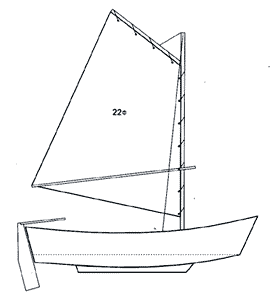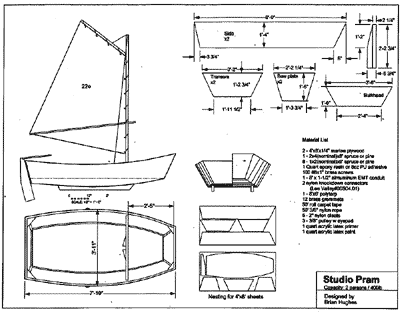Entry 6
Studio Pram
Brian Hughes
|
|
Judge's comments:
She has nice proportions, A boat has to be beautiful
in her owners eyes and it is not easy to get such a
tubby little creature to look the part. She will be
a good load carrier for such a short boat; the shallow
keel arrangement will enable her to sail well enough
to be fun.
I like the simplicity, and the ability to build
with hand tools only; the heavy cuts being done by the
plywood supplier.
But she’s lovely, stable and safe, not fast
but capable and certainly will deliver the goods as
required by the contest rules. Nice drawings , a credit
to the designer. Well done!
|
The idea of building a
boat in a fifth floor apartment brought back memories of my
last apartment many years ago where even the activities of ordinary
life brought angry pounding from my neighbors and ultimatums
from the super.
So the restriction I placed
on my design is that it could be constructed without power tools
or hammering. To this end the side planks are formed from straight
and parallel pieces, cut from plywood by your local lumberyard
at a buck a cut. Every thing else can be cut with a Japanese
pull saw or a back saw. Beveling and fitting can be done with
a block plane, surform, or spokeshave. Chine logs and gunnels
are stock lx2's. The bilge keels are 2x4' s. The mast is aluminum
conduit. Weight should be about 60 pounds, so if it doesn't
fit in the elevator, hefting it up and down the stairs amounts
to a good aerobic workout. This would take two people, alternately
carrying the boat and looking out for nosy neighbors and the
super.
It may have been another
apartment, but I remember an earnest young man standing at my
door patiently pointing out illustrations in a tract, explaining
that Noah could fit all the animal pairs in his boat because
he made it like a box. Take a box, put a little conical development
on the sides, rocker the bottom, and cant the ends, and you
end up with a pram. A pram 5 cubits long, by 3 cubits wide,
by I cubit high, will hold a pair of humans.

A pair of 6 foot oars
and hardware store oarlocks can propel this pram. A modest sail
harnesses the wind. The rudder uses nylon knockdown fittings
for gudgeons and pintles. The rudder snaps onto the stern and
hitting a rock pops it out without damage. There are a number
of power options. For the conventionally minded a conventional
gas or electric outboard of 2 horsepower or less can be clamped
onto the transom, A gas leaf blower pointed aft actually has
enough thrust to get you places and enough noise to get you
noticed over the cigarette boats. Lastly, a gas weed wacker
with a cut down model airplane propeller fitted in place of
the spool, can be used as a surface drive, with the propeller
hub held above the waterline.
I imagine that rent on
a Greenwich Village studio apartment would necessitate a good
six figure income, but my apartment cost me $200 a month and
back then I could hardly afford that. Old habits die hard, so
the projected cost has been held down to about $350 all up,
including tools and a yard sale acquired leaf blower or weed
wacker.

(click to enlarge)
Bio
Brian Hughes lives in Winnipeg,
Canada and makes his living designing ventilation and plumbing
upgrades for the campus of the local university. He learned
woodworking and
boat building at his father's knee and what he knows of boat
design from the internet.



